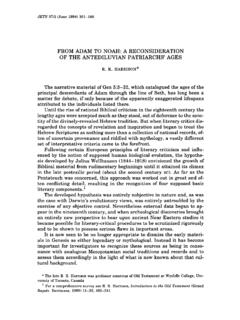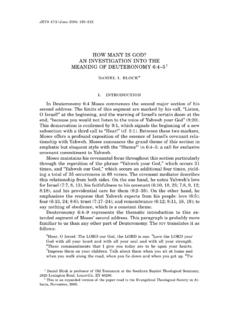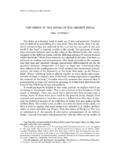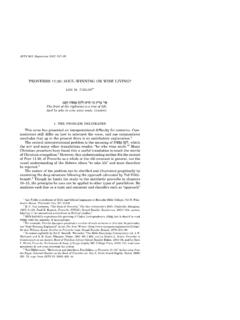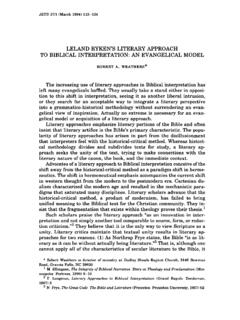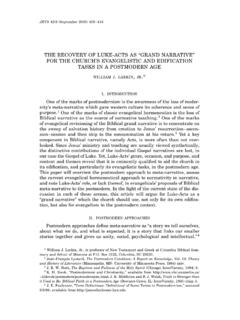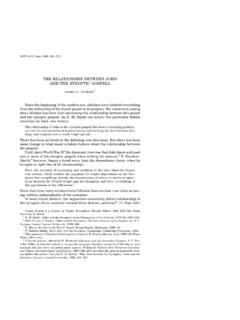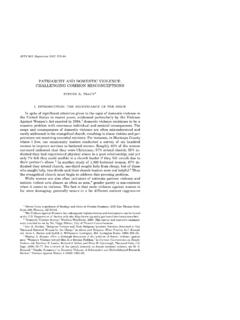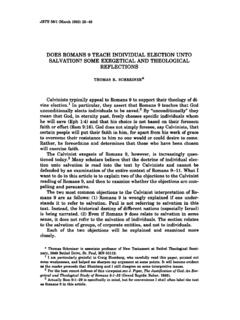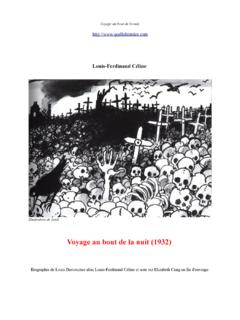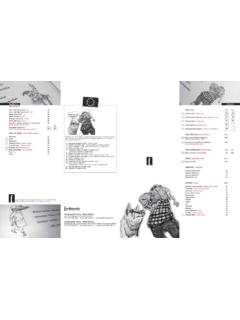Transcription of CHRISTIAN IDENTITY IN THE AFRICAN CONTEXT: …
1 JETS 50/1 (March 2007) 121 43. CHRISTIAN IDENTITY IN THE AFRICAN context : reflections ON KWAME BEDIAKO'S. THEOLOGY AND IDENTITY . keith ferdinando*. The dramatic shift in the center of gravity of global Christianity in the last fifty years is now universally As a result the AFRICAN church has become a major influence in the world CHRISTIAN movement, which makes it increasingly important to keep abreast of CHRISTIAN reflection and debate on the AFRICAN continent. Few contributors to that debate are more widely influential, especially among evangelicals, than the Ghanaian scholar Kwame Bediako, founder and director of the Akrofi-Christaller Memorial Centre for Mission Research and Applied Theology in Ghana, and a theo- logian of international reputation.
2 Moreover, the issue of CHRISTIAN IDENTITY which he addresses in his most celebrated work, Theology and IDENTITY : the Impact of Culture on CHRISTIAN Thought in the Second Century and Modern Africa, 2 is among the most critical concerns of AFRICAN theology. It is this work that constitutes the focus for the present discussion. The question of IDENTITY has indeed emerged as a leading issue in many of the theologies coming out of churches in the Two-Thirds World. Conversion to Christ necessarily involves a measure of discontinuity with the pre- CHRISTIAN past, and this has been perceived by some as problematic, the more so if it is felt that missionaries involved in the transmission of the gospel also impose their own culture.
3 In the AFRICAN context theologians such as E. Bolaji Idowu and John Mbiti have sought to address the problem, but it is not an entirely new one. In the Gentile church of the early centuries CHRISTIAN thinkers also debated the relationship between the CHRISTIAN faith and the religious context from which new believers had been drawn. In his article, The Gospel as Prisoner and Liberator of Culture, Andrew Walls has drawn attention to this correspondence, pointing out that Idowu and Mbiti were wrestling with essentially the same problem as Justin Martyr and Clement of Alexandria.
4 3 It is this parallel that Kwame Bediako seeks to * Keith Ferdinando is lecturer in missiology at the London School of Theology and theological education consultant with Africa Inland Mission. 1. See, , Philip Jenkins, The Next Christendom: The Coming of Global Christianity (New York: Oxford University Press, 2002). 2. Kwame Bediako, Theology and IDENTITY : The Impact of Culture on CHRISTIAN Thought in the Second Century and Modern Africa (Oxford: Regnum Books, 1992). 3. Andrew F. Walls, The Gospel as Prisoner and Liberator of Culture, in The Missionary Movement in CHRISTIAN History: Studies in the Transmission of Faith (Edinburgh: T & T Clark, 1996) 14.
5 One Line Long 122 journal of the evangelical theological society develop in his influential study Theology and IDENTITY , comparing theological development and the pursuit of IDENTITY in the early centuries of the church's history with the writings of some AFRICAN theologians in the second half of the twentieth century. The original research was carried out at Aberdeen for the degree of doctor of philosophy (Bediako's second doctoral degree) under the supervision of Andrew Walls, who has commended the work as a book of quite outstanding importance.
6 It has indeed been widely appreciated and was reissued in 1999. i. theology and IDENTITY : greek and AFRICAN perspectives Bediako underlines the importance of the IDENTITY question for the AFRICAN church. While he focuses on the comparison between AFRICAN theology and that of the early church, it is clear that in his view the issues are not iden- tical; there is contrast as well. The contemporary AFRICAN CHRISTIAN IDENTITY problem derives not just from the fact of conversion to Christianity from tra- ditional religion, but also from the whole impact of the West on Africa.
7 This, he argues, began well before the arrival of missionaries, particularly with the slave trade which shaped negative European attitudes to and stereotypes of Africa. 4 He sees the missionary enterprise as part of a benevolent Western movement to elevate the condition of AFRICAN peoples, which meant that they must not only be given Christianity but also a total Western cultural package. 5 Underlying this approach were evolutionary and racial theories that had come to permeate Western thinking, and which saw AFRICAN culture as inferior and in need of the contribution of the West.
8 6 Such ideas were shared by those who came with the gospel, and so not only did missionaries challenge AFRICAN traditional religion, but they disparaged traditional AFRICAN civilization at every level; conversion therefore implied both accepting Chris- tian faith and embracing the culture of the West. To become a CHRISTIAN was to become in some sense European and, in sharp contrast with the Pauline mission to the Gentiles, there was little or no conception of the validity, or even the possibility, of a transposition of the gospel into AFRICAN The result was to rob AFRICAN believers of their past, and so of their IDENTITY as Africans, and this has had serious and lasting consequences.
9 Most particularly, Bediako argues that the lack of a serious encounter with AFRICAN traditional religion, the result of its denigration by the mission- aries, severed AFRICAN believers from their religious heritage and so denied them a truly AFRICAN theology by not allowing in the first place for the existence of a heathen' memory in the AFRICAN CHRISTIAN consciousness, the widespread European value-setting for the faith created a Church without 4. Bediako, Theology and IDENTITY 226. 5. Ibid. 227 28. 6. Ibid. 230. 7. Ibid. 234 40. CHRISTIAN IDENTITY in the AFRICAN context 123.
10 A theology.' 8 Bediako therefore concludes that the AFRICAN quest for an authentic CHRISTIAN IDENTITY has been bedeviled by the very missionary enterprise that brought the gospel in the first place. In consequence Chris- tianity is too readily seen by non- CHRISTIAN Africans as a foreign imposition, a religion inherently alien to Africa, and has been critiqued as such by the modern AFRICAN counterparts of Celsus, 9 such as Okot P'Bitek. 10 Accordingly, the central thrust of Bediako's argument is that the creation of a distinc- tively AFRICAN CHRISTIAN IDENTITY depends in large measure on a positive re- evaluation and recovery of the traditional AFRICAN religious past which was the precursor of Christianity.
